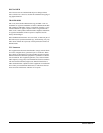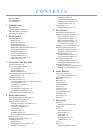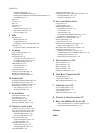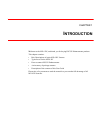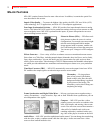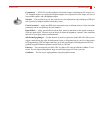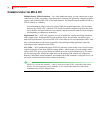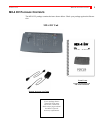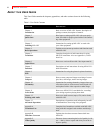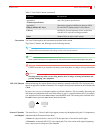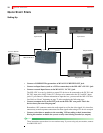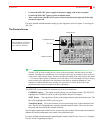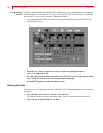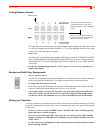
MX-4 DV USER GUIDE CHAPTER 1
6
ABOUT THIS USER GUIDE
This User Guide contains the chapters, appendixes, and other sections shown in the following
table.
Table 1: User Guide Contents
CHAPTER DESCRIPTION
Chapter 1
Introduction
Basic overview of MX-4 DV features, description of
package contents, description of manual.
Chapter 2
Quick Start
Brief steps to setting up MX-4 DV with your equip-
ment. Provided for people quite familiar with connect-
ing video equipment.
Chapter 3
Installing MX-4 DV
Instructions for setting up MX-4 DV to work with
your video equipment.
Chapter 4
Basic Operations
Explains most common procedures and functions used
with MX-4 DV.
Chapter 5
Transitions
Complete description of and instructions for using
MX-4 DV transitions. Also see Appendix A, Transi-
tions List.
Chapter 6
Input Effects
How to use various effects with video input material.
Chapter 7
Functions
Descriptions of and instructions for using MX-4 DV’s
built-in functions.
Chapter 8
PIPs
Instructions for using the picture-in-picture functions.
Chapter 9
Compose
How to create composed images consisting of rectan-
gles, lines, still images, and/or moving images.
Chapter 10
Chromakey
Instructions for creating chromakey images where spe-
cific colors (such as a blue screen) can be keyed out
and replaced with a video sequence or other image.
Chapter 11
Learn Mode
How to use MX-4 DV’s Learn Mode for “recording”
your mixing steps then playing them back.
Chapter 12
Working with Audio
How to use audio sources (tapes, CDs, and so forth)
with MX-4 DV.
Chapter 13
Advanced Operations
Descriptions of operations used infrequently, but still
of substantial use for mixing video programs.
Appendix A
Transitions List
Complete list of transitions available with MX-4 DV,
along with their assigned code numbers and descrip-
tions.
Appendix B
Time Base Corrector
Explains the time-base corrector feature built into
MX-4 DV.
Appendix C
Video Quality
Discusses issues concerning the level of quality in vid-
eos — that is, what to expect and what you can do to
improve quality.



